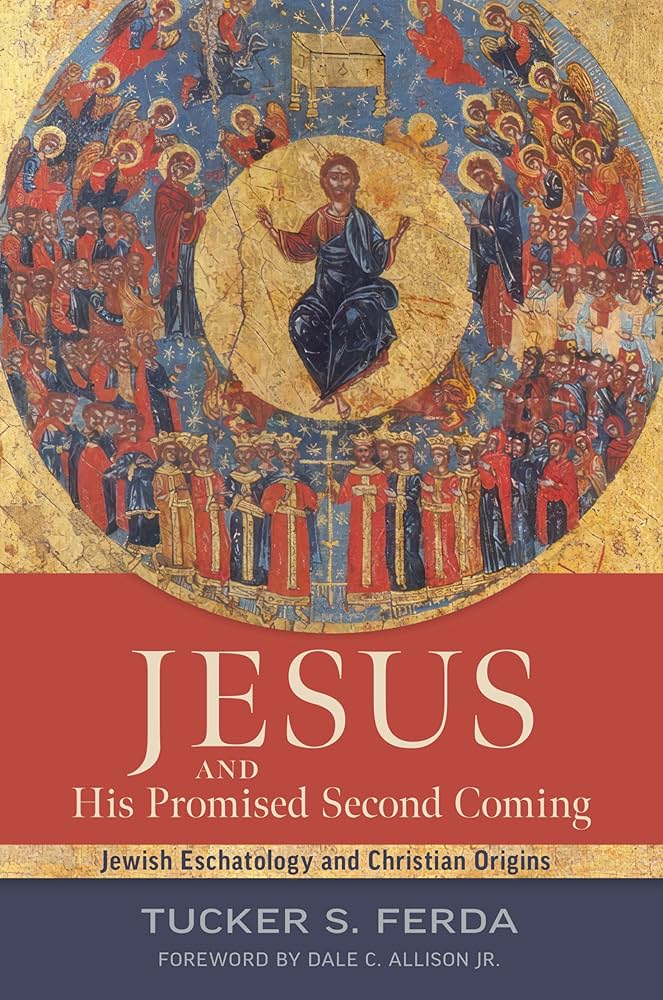Jesus and His Promised Second Coming: Jewish Eschatology and the Origins of the Christian Hope

Jesus and His Promised Second Coming: Jewish Eschatology and the Origins of the Christian Hope. By Tucker S. Ferda. Grand Rapids: Eerdmans. 2024. Hardcover, pp. 564. ISBN: 9780802879905
In Jesus and His Promised Second Coming, Tucker S. Ferda confronts a long-standing scholarly consensus that distances Jesus from the eschatological hope of his return. He asks whether the second coming truly originates with the early church’s theological imagination or if it can be traced back to Jesus himself. Ferda challenges prevailing assumptions that early Christians imposed eschatological expectations onto Jesus, contending instead that a historically grounded reading of the Gospels and Jewish eschatological traditions opens the possibility that Jesus himself anticipated an eschatological return.
Ferda’s thesis is shaped by two central convictions. First, he argues that any serious account of Jesus’s second coming must begin not with speculative reconstructions of Second Temple Judaism, but with the earliest Christian sources, particularly Paul’s letters and the Synoptic Gospels. Second, he insists that historical bias and latent anti-Judaism have long distorted our perception of Jewish messianic expectation, thus undermining our understanding of Jesus’s own eschatological self-consciousness.
In Part I, he critiques modern scholarship’s tendency to downplay Jesus’s eschatological teaching, showing how Enlightenment thinkers such as Reimarus and later scholars like Colani and Bultmann misread or dismissed the parousia, often relying on caricatures of Judaism as overly political or material. This corrective alone makes the book valuable.
In Part II, Ferda demonstrates that Second Temple Judaism contained not a single “messianic idea” but a rich variety of apocalyptic expectations—divine intervention, the return of figures like Moses or Elijah, and resurrection hope. By situating Jesus within this vibrant landscape, Ferda argues persuasively that Jesus creatively reworked these traditions rather than rejecting them.
Part III provides the exegetical core. Ferda demonstrates that parables of absence and return (Luke 12; Matt 25) imply Jesus anticipated an interim period before the eschaton and that his self-identification with Daniel 7’s “Son of Man” reflects an expectation of posthumous vindication, “coming with the clouds” after the general resurrection.
Finally, Ferda proposes that the earliest Christian communities did not invent the second coming as a post-Easter theological coping mechanism, but rather received and continued Jesus’s own eschatological framework. This overturns the often-assumed dichotomy between “Jewish messianism” and “Christian spirituality”.
Ferda’s work excels in three ways. First, his historiographical clarity allows readers to see how theological and ideological commitments—not just historical evidence—have shaped scholarly consensus. Second, his careful attention to Jewish sources corrects the flattening of Second Temple eschatology into a monolithic hope. Third, his readings of Gospel passages are both historically sensitive and theologically astute. By situating Jesus within, not against, the matrix of Jewish apocalyptic thought, Ferda reclaims a historical Jesus who truly hoped for a divine future and whose expectation of return was not foreign to his Jewish context but continuous with it.
Ferda’s thoughtful reconstruction invites further reflection on two key questions. First, if Jesus truly envisioned an interim period between his death and return—as Ferda persuasively argues—how might this reshape the way churches today talk about hope, waiting, and the kingdom of God? This invites a more patient and faithful posture in the present, rather than anxious speculation or disillusionment.
Second, how might Ferda’s respectful engagement with Jewish eschatological traditions encourage deeper interfaith conversations and a richer understanding of Christianity’s roots in Second Temple Judaism? His approach offers an opportunity for readers to appreciate the diverse hopes of Jesus’s world without falling into caricatures or false contrasts between Judaism and Christianity. These questions open the door for further dialogue—historical, theological, and pastoral.
Ferda’s work is a significant achievement. He writes with clarity and balance, grounding his argument firmly in Second Temple Jewish eschatology while dismantling older scholarly tendencies to dismiss Jesus’ own expectation of return. The book’s greatest strength lies in its combination of rigorous historical research and theological sensitivity, making it both a reliable academic resource and a stimulating guide for church readers. If there is a limitation, it is that Ferda occasionally assumes familiarity with technical debates that some readers may not share. Even so, this is an important and persuasive study that deserves careful attention from scholars, pastors, and informed lay readers.
Jesus and His Promised Second Coming is a significant and timely contribution. This book challenges assumptions, re-centers Jewish eschatology, and gives historical credibility to Jesus’s second coming without lapsing into apologetics. Scholars, pastors, and students will find it compelling for its intellectual honesty, methodological rigor, and theological relevance. Jesus and His Promised Second Coming is essential reading for anyone engaged in Christology, eschatology, or the Jewish roots of Christian faith.
Andri Kosasih, Ph.D.
Adjunct Professor, Department of Communication and Rhetorical Studies
Duquesne University
August 2025
